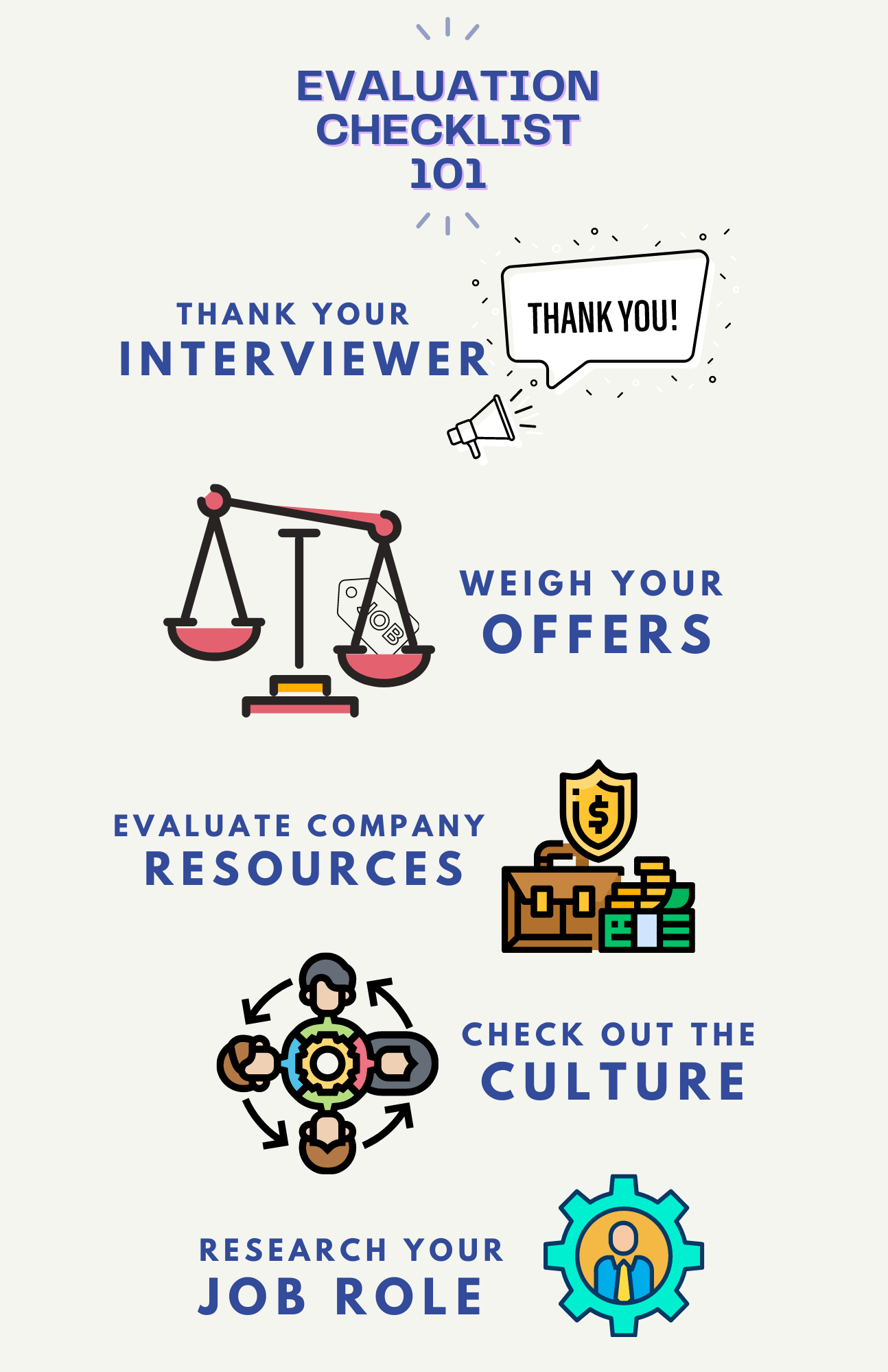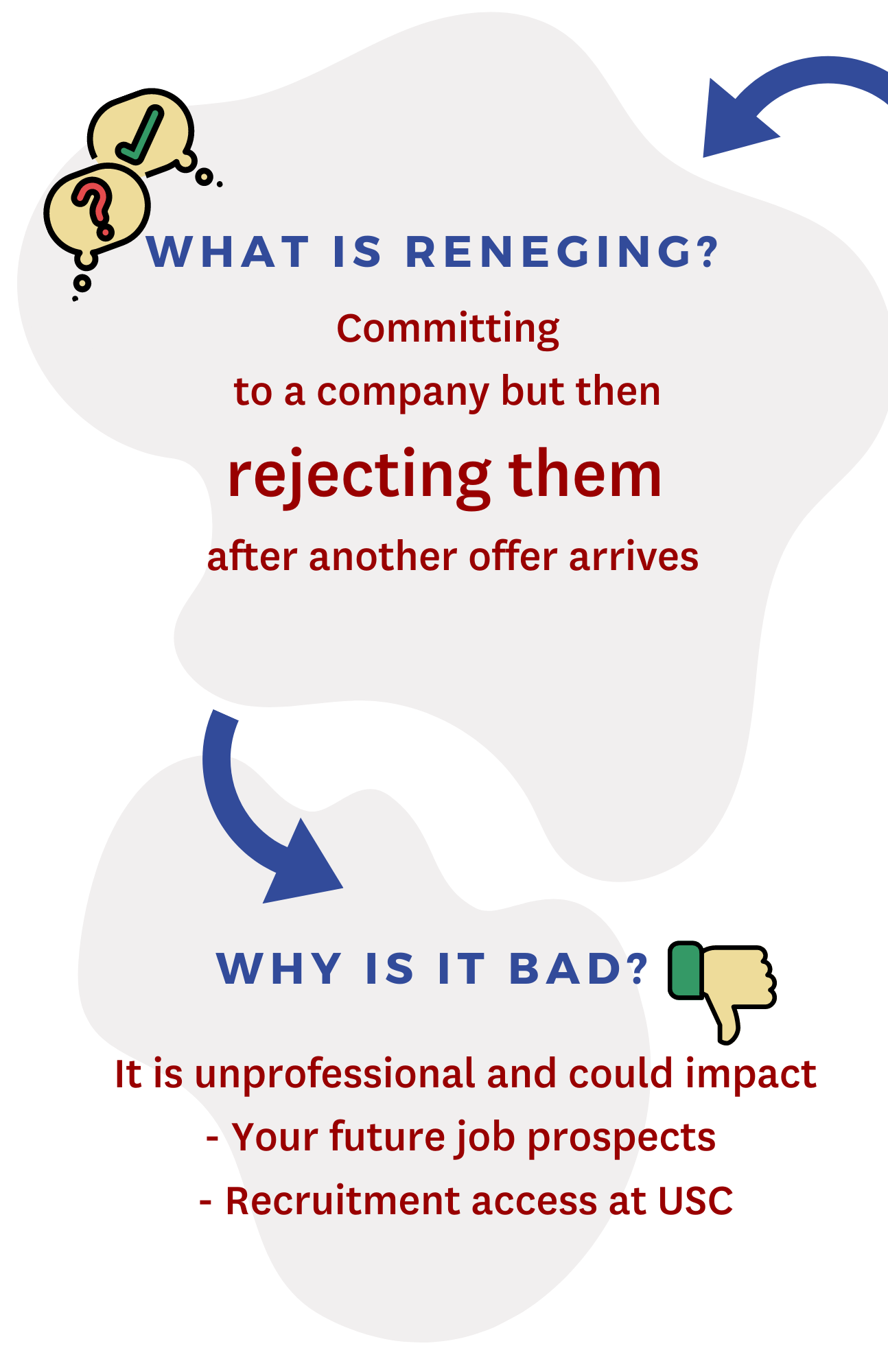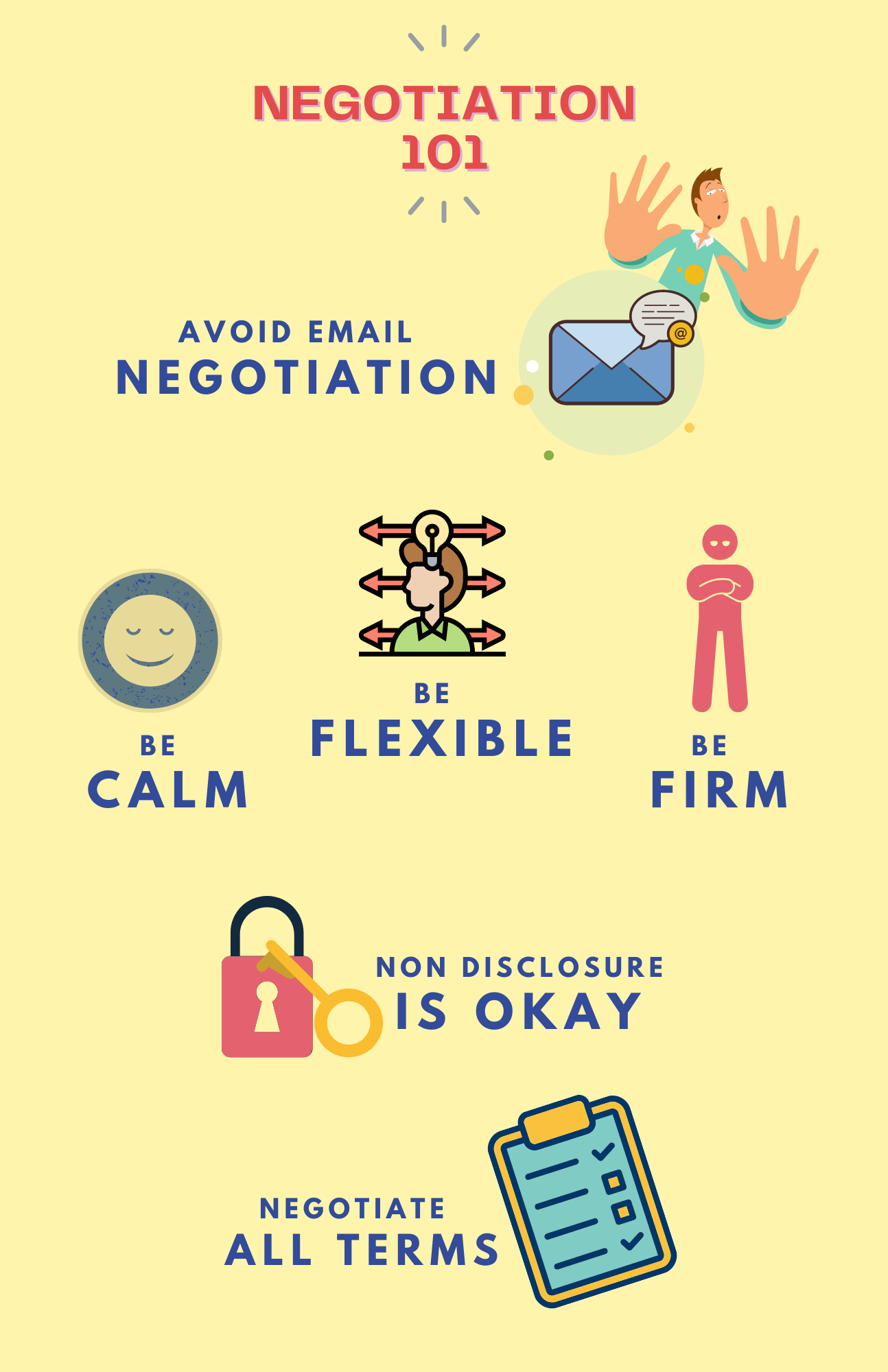Job & Internship Toolkit ➜ Evaluating & Negotiating Offers
Evaluating & Negotiating Offers
Evaluation Process:
Factors to Consider
-
Begin with an assessment of yourself, your needs, and your desires. Ask yourself:
- Will this job help me move toward my career goals?
- Will this job allow me to fulfill my personal priorities and obligations?
- Is the organization a fit for my personal culture/character?
- Is the hiring package what I am looking for?
- Evaluate the company, position, and location
- Company: Evaluate its current position in the industry and learn all about the company culture.
- Position: Consider the job responsibilities, team dynamic, work schedule, etc.
- Location: Is the position remote, in-person, or hybrid? Think about your commute, cost of living, climate of the area, and possible relocation.

Job Offer
-
Consider everything included in the company's hiring package. This is the total compensation package and includes many things outside salary.
- Benefits package: Healthcare, Dental, Vision, Retirement (401K)
- Fringe benefits: vacation, sick time, remote, in-person, or hybrid, professional development, stock options, sign on bonuses, childcare, etc...
-
Take into consideration benefits that you value as well as what the company is or isn’t offering.
-
Create a budget to assess whether you can afford to accept a job based on your monthly expenses and lifestyle.

Additional Tips
- Take your time to review the offer to avoid making a hasty decision.
- In the Fall semester, it is recommended that employers give students at least 2 weeks or until November 1st, whichever is later, to make a decision when accepting an offer. In the Spring semester, it is recommended that employers give students at least 2 weeks from the date of the offer or until March 1st, whichever is later. Learn more by visiting the On-Campus Recruiting Guidelines Offer Timeline
- If handling multiple offers, see the "Evaluating Multiple Offers" section below for more information.
Evaluating Multiple Offers:
You received multiple offers, great news! Now what?
- Express enthusiasm without accepting the offer.
- Evaluate each offer before saying yes. Don't feel forced to accept on the spot. Consider the responsibilities, salary, benefits, and all information necessary to help make a decision. See Offer Evaluation Process for more details.
- Create a Decision Matrix
- List all of the factors you value in a job
- Rank each factor based on how important they are to you
- Determine how much the job offer will meet each factor by rating on a scale of 1-10
- Ask for a timeframe to make the decision. If you received an offer, but are still waiting to hear back from another company, you may ask for a reasonable time extension to make your decision. You may choose to mention the other offer to the first company or ask the second company to expedite the process.
- It is recommended that employers give at least 2 weeks to make a decision when accepting an offer, learn more here: On-Campus Recruiting Guidelines Offer Timeline.
- Accept only one offer. If you accept an offer and then retract, there are protocols and consequences that may occur during this process. Please see What is Reneging? for more information.
See How to Handle Multiple Job Offers for additional tips.

What is reneging? Going Back on an Offer:
It can harm your professional integrity and should be avoided

- Evaluate before accepting an offer - You want to maintain positive relationships, so be transparent with companies you are considering. This can leave the door open to future opportunities with the company.
- Make an appointment with VCC - If you are unsure of how to proceed, please make an appointment with a VCC Career Advisor.
Consequences of Reneging
These are some of the potential consequences you may be subject to if you choose to renege:
- Harm to your professional reputation.
- Limited and less desirable opportunities for yourself.
- Loss of access to Viterbi Career Connections and USC Career Center Events & Services.
- May include loss of future CPT approval.
- If you have questions about the consequences of reneging, please make an appointment with a VCC Career Advisor.
For more information, please review the On-Campus Recruiting Agreement.
Negotiation Process: Before
- Negotiate after an offer has been made.
- Negotiate only if you are seriously considering accepting the offer.
- Begin with the research on the appropriate salary range, median, and average for the industry, position description, and the location you are offered.
- Bureau of Labor Statistics: View median annual wages.
- Economic Research Institute: Review salary ranges and median/means for 7,000 positions in over 8,000 locations in the US, Canada and Europe.
- NACE Salary Calculator: Reliable salary data for over 900 occupations.
- Salary.com: Creates personalized salary expectations based on job title.
- Intuit's Mint Salary Data: Uncover income opportunities by comparing your salary to hundreds of others.
- levels.fyi: Review salaries by job level and total compensation
- Consider your ideal salary (should be realistic) as well as your "walk away" point. Your walk-away point is the minimum salary you pre-set where you will not accept the position.
- Have numbers in mind before you open the negotiation so that you do not let your emotions take over the discussion.
- Practice by taking the AAUW Work Smart & Start Smart: Salary Negotiation online course.

Negotiation Process: During

- Avoid negotiating over email - It is best to set up a time to speak directly with the person with whom you will negotiate as opposed to negotiating over email.
- Be firm - It is acceptable to be firm in your negotiations as long as you are not overly aggressive.
- Remain calm and flexible - Justify your increased salary needs by focusing on your accomplishments, skills, experience, awards, recognitions, or other benefits you bring to the employer. Do not use emotions or feelings to justify why you deserve more salary. Instead, focus on how the employer benefit from hiring you.
- Non-disclosure is okay - It is appropriate to politely refuse to provide an employer with specific information about any job offers you may have received from other employers.
- If asked, you can affirm if you have other offers pending.
- You do not have to name the organizations that have made offers to you, nor are you obliged to provide specific information about the salaries, perks, or other compensations involved.
- Broad responses to these questions that include salary ranges (rather than specific dollar amounts) are perfectly acceptable.
- You can negotiate other terms such as a sign on bonus, relocation benefits, transportation reimbursement, accruing more vacation hours, or remote work privileges.
- Put ALL negotiation offers on the table - Propose all your desired changes at the same time.
Negotiation Process: After
- Get everything in writing before responding to the offer.
- Read everything fully before signing.
- Notify the employer that you have accepted the offer.
- Celebrate your hard work!

REMEMBER...
- Negotiation is about compromise. You likely won’t get everything you ask for.
- Review more information on how to evaluate, negotiate, and accept an offer.
- Attend one of our upcoming workshops on Job Offer & Salary Negotiation
- View a pre-recorded session on Handshake.

Book an advising session with a VCC Career Advisor today!
BOOK NOW
View Online Workshop

